I recently decided to not use AI and ChatGPT at all for any of my creative work. The reason was simple. I realised that in order to make sure that my writing was edited well without any spelling or grammatical errors, I was gradually letting a machine define my creative process.
Absconding ChatGPT after having used it for the past 2 years to generate ideas, get feedback, edit for grammar mistakes and also sometimes to just brainstorm created a huge gap in my process of writing. Even though I have always written all my articles and pieces myself, the sudden absence of a step that made my work error free created a shift in the way I wrote. In the past 2 months of using zero AI, I have thankfully and gradually rediscovered my writing pace, process and style.
While I quit AI, there’s another AI that has been calling out to me in the past few months. Upon going through the process of redefining my writing process, I finally answered the knock of this new AI and decided to embrace it.
It all started last year when my friend gifted me a film camera. That humble camera, a machine older than my parents forced me to rethink everything I knew about photography. That was the first time I realised the power and beauty of analog.
The AI I am looking forward to embrace is Analog Intelligence.
While for my photography practice, it meant embracing the old and robust film camera, for the craft of writing it simply meant letting go of the laptop every once in a while to embrace writing the analog way - using pen and paper.
As part of my month long workshop - The Storytellers Collective where all creatives (including me) committed on a creative goal for the month, I committed to using my notebook and pen (+ whiteboard) to do all my writing. In the past few weeks of primarily using my notebook and pen to write, I experienced many shifts in my writing process and realised why the analog route is the intelligent route to take.
Less scope for constant self editing
Digital writing mediums (laptops, phones etc) are more forgiving. With a click of a button, we can quickly remove all the mistakes, errors and blemishes from our writing. However, there is a price that we pay for this gardening that we do.
When I started writing using my notebook, I realised how I couldn’t edit whatever I was writing. There was no backspace to erase my mistakes. The mistakes stayed on the page and with a strikethrough, their presence grew all the more. Initially, it felt a bit annoying to see some of my mistakes on paper but with time I realised how fruitful it was to have the entire idea generation process still alive and breathing.
Writing using pen and paper takes away the pressure to constantly self edit your work and to be a lot more accepting of the mistakes and thoughts that emerge but don’t make it to the final process.
Thought process is visible
Using a notebook and pen helps the writer to trace back all the different pathways in which their mind was thinking for the particular topic. Some thoughts or ideas may not be useful at that time but their presence on the page ensures that the writer may pick them up or use them for later texts or for some other project.
Distance from screen and distractions
The best gift of writing using a pen and paper is the absence of internet and social media. I hope and pray that we’re still light years away from having our notebooks and pens integrated with social media and internet. In the meantime, we can embrace these analog tools to distance ourselves from our screens and from the many distractions of the internet.
When I write on my laptop, the possibility of opening up other tabs or to scroll youtube/instagram lures me all the time. That possibility doesn’t exist when I isolate myself without any devices and just write using a pen and paper.
Scope for free writing, comments, doodling
While notebooks have a specific number of pages and on the contrary the number of words and pages that I can fill up on my laptop are infinite, notebooks allow for a lot more space than digital devices. Let me explain.
The analog process of writing is not restrictive. I can leverage the space between the lines, the margins, the empty space on the top and bottom of the page to write remarks, make notes, write ideas and comments or to just doodle.
I am also suddenly reminded of how in school, many of us used to treat the last few pages of the notebook as rough work and for remarks. Sure enough, there were FLAMES going on there as well but still it was a good free flowing space for us to jot ideas and brainstorm.
I am also a huge fan of using whiteboards. I love creating (not the most aesthetic) flowcharts and mind maps. A bonus of using whiteboards is that if you’re lucky a cat might come and bless your writing!
Get lost in day dreaming
The biggest con of using ChatGPT was that it removed any friction whatsover to arrive to an answer or a conclusion. I had forgotten what it meant to day dream and to get lost in thought while looking outside my window. Some might see it as wasting time but if there’s something that I have absolutely relished after switching from Artificial Intelligence to Analog Intelligence is the joy of day dreaming.
While on a laptop, there are many distractions and opportunities to waste time, in the analog world even day dreaming and getting bored is a creative process. You’re allowing your mind to swim to different oceans instead of binding it to the safety of the shore. I always like to believe that it is much better to lose an hour to day dreaming than to waste even 10 mins watching reels.
Day dreaming and just looking outside the window is how we enable our mind to think beyond what we know and can think of. Day dreaming is our narnia to access the wisdom outside of us.
The hand to paper connection is smoother
When I write the analog way, the hand to pen to paper connection is smoother and feels more intimate. I am not sure if there is any science to it and this might be absolutely personal and contextual but I strongly feel that the flow from brain - hand - pen - paper is a lot more cognitively better than otherwise.
Exactly why even Julia Cameron in her book Artist Way recommends that writers do the ever famous exercise - Morning Pages using longhand writing. Also, the writing on notebooks is a lot more tangible. Much like reading physical books allows for tangible visualisation of the book read, the notebook allows for a tangible visualisation of the words written which I can confirm is a huge motivator for any writer out there.
More portable, cheap and doesn’t require charging
Notebooks and pens are the cheapest, portable and most inexpensive to maintain writing device. They don’t have to be charged. They can be taken everywhere.
Its sexier.
Yeah, I will end there.
PS: But hey Rishabh it doesn’t seem like you’ve written this newsletter on a notebook. Why downvote using a laptop only to write and publish using one?
My perspective: Digital devices are excellent mediums to edit and publish. If it wasn’t for technology, I would have never been into the creative field. I am ever grateful for these devices as they allow my work to reach you. However I feel that the process of brainstorming, idea generation and writing can be done the analog way. Laptops can be then used to edit the final work and to publish it.
Btw, I did write this newsletter using a notebook and a pen. Here you go!
Thanks for reading.
This newsletter is ad-free, AI-free, and an anti-algorithm publication.
The Storytellers Collective’s first batch is almost over. We’re a team of 8 creatives, and it has been a joy working with these lovely creative people.
I am excited to announce that I am opening registrations for July. If the invitation calls out to you, and if you want to spend time doing creative work in the presence of a community, sign up here. For any inquiries, reply to this email.
I invite you to reflect and write on the following prompt:
Write about your views on analog vs digital.
As a feature of all my newsletters, I share a blackout poem, a quote, a song, a book,
plant-based meal, film/video that inspired me, and some photographs.
Blackout Poem: Tutorial to make your blackout poem
Quote: Regardless what technology is, I like analog too.
- Lou GrammSong: This has been my jam the last few days.
Book/Newsletter/Article: Why creative writing is better with a pen
Meal: Smoothie bowls for breakfast everyday!
Film/Video: Brilliant mini documentary on the camera as a fantastic machine.
Photograph(s):
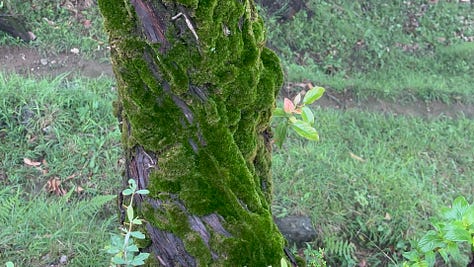
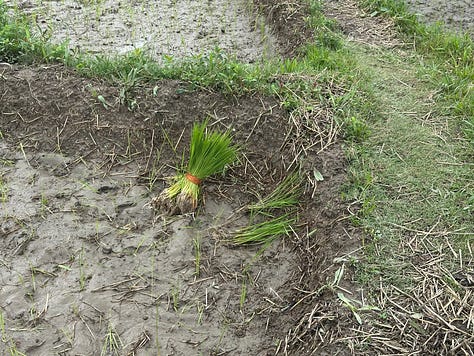



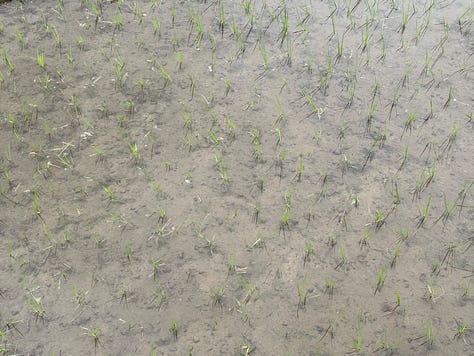
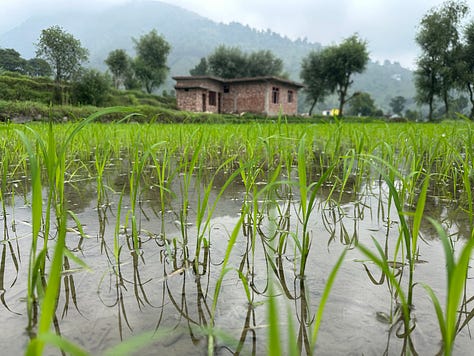

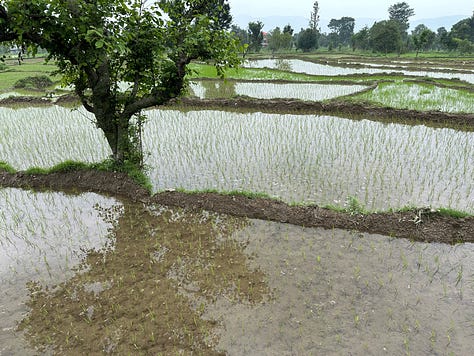
Rice Farming + Monsoons
Read my other newsletters :
Why I Ran From Vipassana
The story of moving to the mountains
My relationship with failure
Photography, my first love
Read my short stories :
Socratree
Quenched
Chetak
Coronaceptive
Compilation of all recommendations :
Video recommendations
Music recommendations
Books read
Free Journaling eBook:
Last year, I compiled a journaling ebook for myself for times when I feel I have nothing to write. I am offering it to you for free. Whether you’re starting your journaling journey or feeling stuck in a creative block, this guide will help you find your way.
Download your journaling eBook here.
Thank you for reading my work
Rishabh





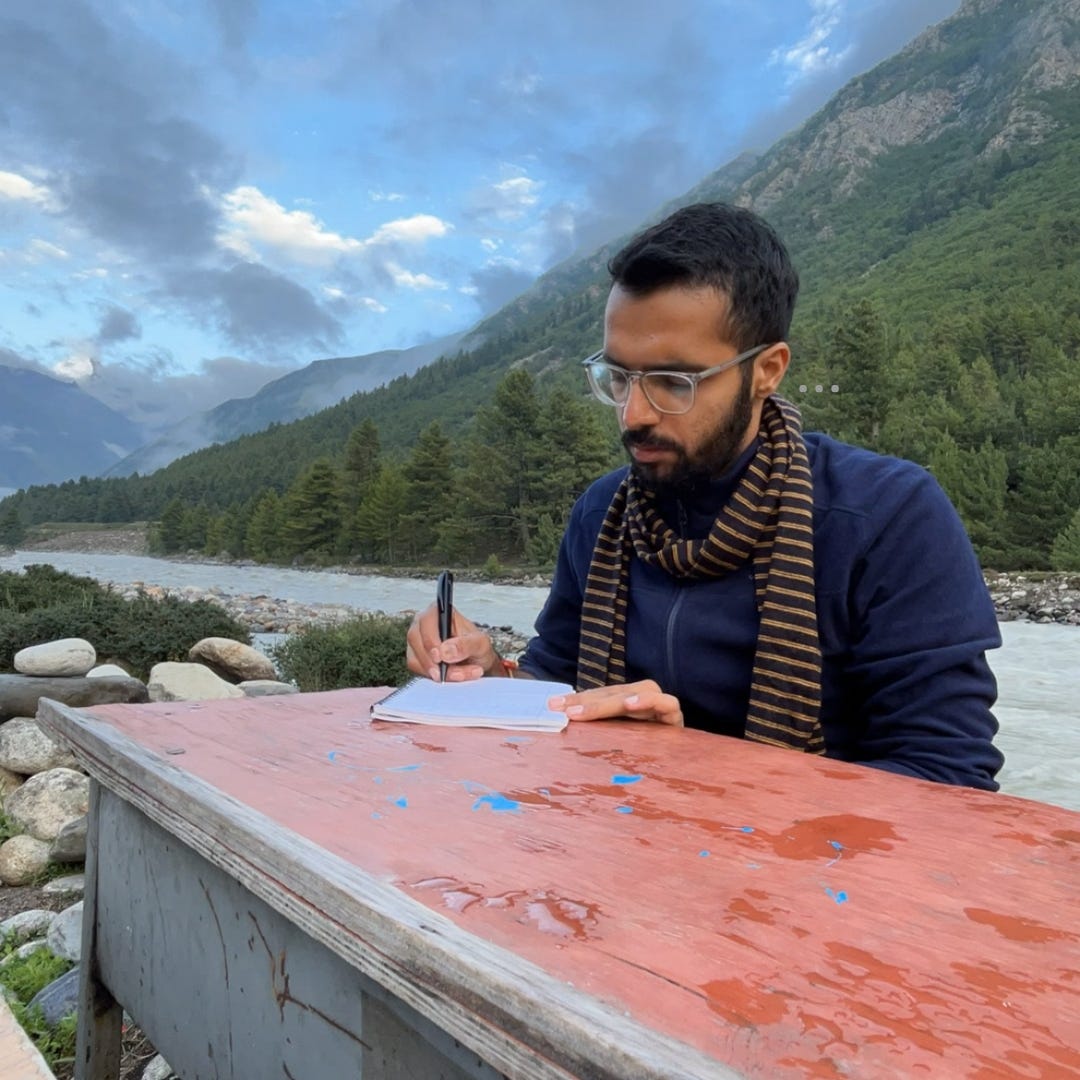


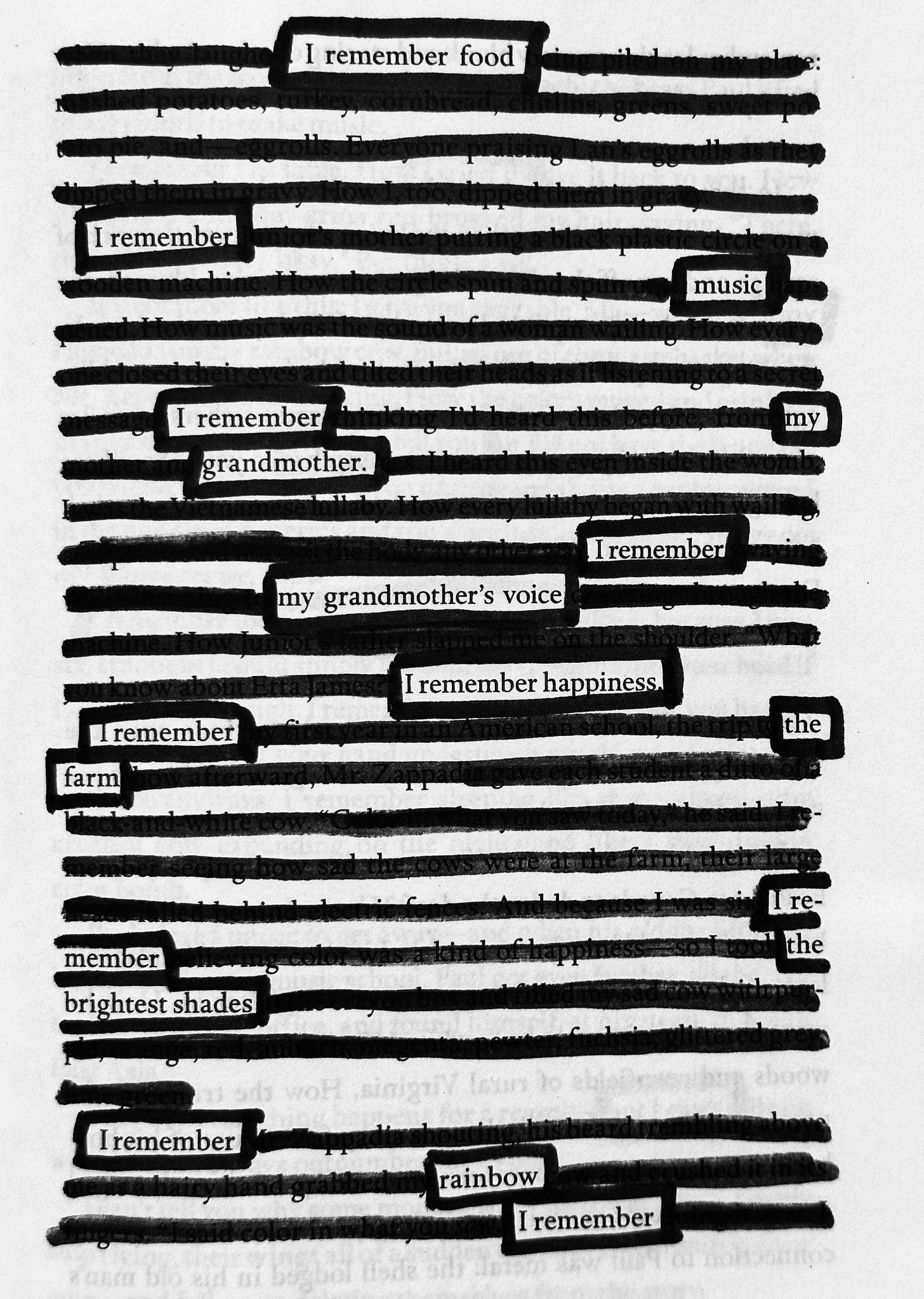

“Day dreaming is our narnia to access the wisdom outside of us.” - my favourite line from this essay!
I have no idea how someone can live without notebooks and pens! 😅
However, I think I have never written something longform by hand, since childhood. Brainstorming, morning pages, scribbles, journaling - Yes - but not an essay. Will try it.
This was really a very nice read. You know, I do write in notebooks sometimes. Especially when it's in my mother tongue hindi. The only downside of is to type it again for posting. Which means double the time and effort.
Writing by hand is much more difficult than writing in phone or laptop. My fingers really start to hurt after finishing 3 A4 sized blank sheets in a single go.
Also, I can see the visible difference in my handwriting after 2 pages only which is slightly annoying. The writing start to seem bad. The number of pages used make it feel like I have written so much already but in reality it's really very short. Also it's takes more effort to write than to type. I don't know.. typing on a laptop is easier but yeah, writing in a notebook is comforting. It connects you with the writing and it feels great!!
I think I'll just keep switching between the two often .
But this was a very insightful read.. thank you for writing this.